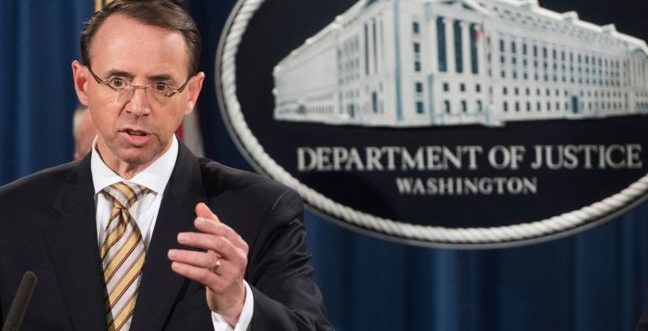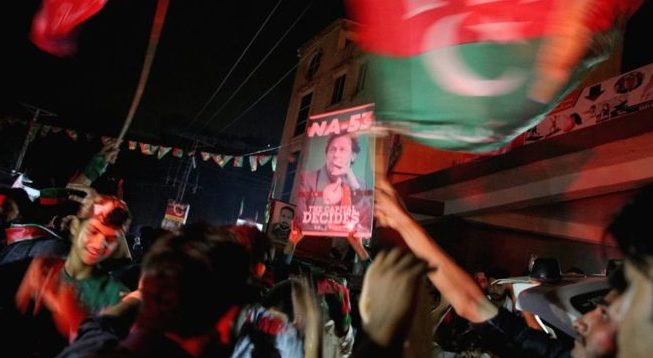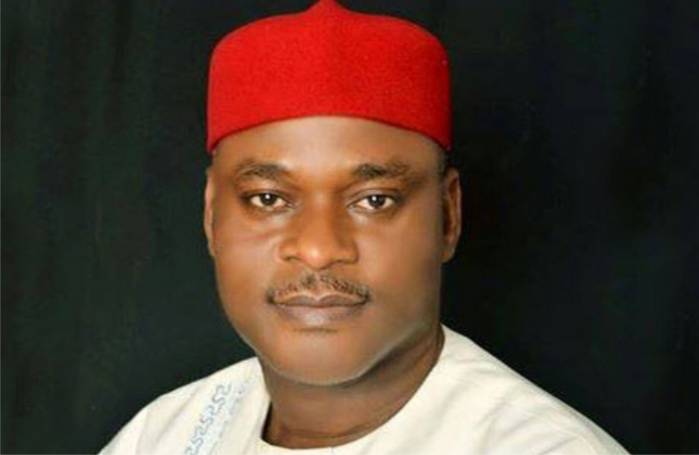Ex-cricket star, Imran Khan, has taken an early lead as votes are counted in Pakistan’s poll, but political rivals allege vote-rigging on a major scale.
Early unofficial results suggest his PTI party are in the lead, but it will need to form a coalition if it is unable to secure a simple majority.
Results are trickling in slowly, but election officials deny rigging saying there are simply technical problems.
Voting day saw bloodshed, with many killed in a blast at a polling station.
This historic election will mark only the second time that a civilian government has handed power to another after serving a full term in Pakistan.
With 42 per cent of polling stations counted, the Election Commission of Pakistan had Mr. Khan’s Pakistan Tehreek-i-Insaf (PTI) party leading in 113 of 272 contested National Assembly constituencies, according to Pakistan’s Dawn Newspaper.
But the party of former Prime Minister Nawaz Sharif has weighed in rejecting the results, as have a host of smaller parties, all alleging vote-rigging and manipulation.
“The way the people’s mandate has blatantly been insulted, it is intolerable,” Shehbaz Sharif, leader of the PML-N and brother of the former prime minister.
Election officials say delays in releasing the results are simply down to technical failures in the electronic reporting system and the votes are now being counted manually.
But any delay to the formation of a government is likely to be a concern for Pakistanis waking up to an unclear result, considering Pakistan’s turbulent political history and a brewing economic crisis.
Pakistan has a population of nearly 200 million, and is a nuclear-armed rival to India, a key developing economy and one of the world’s largest Muslim-majority nations.
The country has been ruled on and off by the military during its 71-year history, so this election is significant because it is considered the country’s second consecutive democratic transition.
The election has been seen as a contest between Imran Khan’s Pakistan Tehreek-e-Insaf (PTI) party and Mr. Sharif’s Pakistan Muslim League-Nawaz (PML-N).
Mr. Sharif, who won the last election has been jailed for corruption after a scandal stemming from the Panama Papers leak.
Both the run-up to the vote, and the vote count itself, have been highly controversial.
Ahead of the elections, the PML-N complained of a targeted crackdown by the security establishment, with the alleged help of the courts, in favour of the PTI party.
The Pakistani military denied interfering in politics.
Independent media, meanwhile, say there have been blatant attempts to muzzle them, while the human rights commission has said there are “ample grounds” to question the legitimacy of the polls.
After the polls closed on Wednesday, several political groups alleged that vote rigging was taking place in polling stations – something denied by election officials.
Tokyo Sarin attack: Japan executes last Aum Shinrikyo members on death row
Japan has executed the remaining members of a cult behind the deadly 1995 Sarin attack on the Tokyo subway.
The six men were the last members of the Aum Shinrikyo cult on death row, and were executedon Thursday, the justice ministry said.
Seven others responsible for the attack, including leader Shoko Asahara, were put to death earlier this month.
The Sarin attack, Japan’s worst terror incident, killed 13 people and injured thousands more.
The cult was accused of several other murders and an earlier Sarin gas attack in 1994 which killed eight and left 600 injured.
“The pain and anguish of the people who were killed and their families as well as of the survivors left with disabilities, was unimaginable,” said justice minister Yoko Kamikawa at a news conference.
Those put to death on Thursday included a key Aum Shinrikyo recruiter and cult members who released the nerve gas in train carriages, reported Japanese broadcaster NHK.
The execution of all 12 cult members involved in the attack as well as Asahara had been postponed until their final appeals were completed, which happened in January.
On 20 March 1995, cult members released Sarin on the subway in the Japanese capital.
Witnesses described noticing packages leaking some liquid and feeling stinging fumes hitting their eyes soon afterwards.
The toxin struck victims down in a matter of seconds, leaving them choking and vomiting, some blinded and paralysed.
Thirteen people died.
Aum Shinrikyo, often shortened to Aum, believed that the end of the world was coming and that those outside the cult would go to hell – unless they were killed by cult members.
In the months after, members of the cult made several failed attempts to release hydrogen cyanide in various stations.
The cult, whose name means “supreme truth,” began in the 1980s as a spiritual group mixing Hindu and Buddhist beliefs, later working in elements of apocalyptic Christian prophesies.
Cult leader Shoko Asahara declared himself to be both Christ and the first “enlightened one” since Buddha.
Republicans launch bid to impeach US deputy attorney general

Source: BBC.com
Republicans have launched a bid to remove the Department of Justice official overseeing the Russia inquiry dogging Donald Trump’s presidency.
House of Representatives conservatives have filed articles of impeachment in an effort to oust Deputy Attorney General Rod Rosenstein.
The measures were introduced on Wednesday evening by Representatives Mark Meadows and Jim Jordan.
They accuse him of stonewalling their inquiries, which his department denies.
READ ALSO: Facebook shares crash as privacy rules bite
Impeachment would have to be approved by a majority in the House and backed by two-thirds of the US Senate to convict Mr. Rosenstein, which makes the plan a long shot.
Within weeks of becoming deputy attorney general in April 2017, Mr. Rosenstein found himself in controversy after a memo he wrote was cited as the reason for President Trump’s decision to fire FBI chief, James Comey, who was investigating Russia’s alleged interference in the 2016 US elections.
Mr. Rosenstein then appointed Robert Mueller as special counsel to take over the inquiry.
Earlier this month, the Department of Justice charged 12 Russian intelligence officers with hacking Democratic officials during the 2016 vote.
Although Mr. Rosenstein has said there is no evidence they “altered the vote count or changed any election result,” the announcement came just before Mr. Trump’s controversial summit with President Vladimir Putin in Helsinki.
President Trump’s campaign team has been accused of colluding with Russia to influence the outcome of the presidential election.
In 2016, US intelligence agencies concluded that Russia had used a state-authorised campaign of cyber attacks and fake news stories planted on social media in an attempt to turn the election against Hillary Clinton.
Thirty-two people have now been indicted, including four members of Mr. Trump’s campaign team and 25 Russians.
Both Mr. Trump and Russia have denied the allegations, with Mr. Trump repeatedly describing the investigation as a “witch hunt.”
Australian media giants Nine and Fairfax agree to merge
Australian media giants, Nine Entertainment and Fairfax, have agreed to merge, creating what they say will be the nation’s “largest integrated media player.”
The surprise deal, worth an estimated A$4bn (£2.25bn; $3bn), gives Nine Entertainment a 51.1% stake.
The new business will be called Nine.
Australia has a highly consolidated news media market.
The loss of the name Fairfax, a company founded in 1841, was lamented by many.
The deal wraps in Nine’s television network, one of the nation’s biggest, and Fairfax newspapers including The Sydney Morning Herald, Melbourne’s The Age and The Australian Financial Review.
It also includes Fairfax’s many radio and digital assets, including news websites in other cities and property listings business Domain.
Current and former Fairfax employees joined others in expressing sadness about the deal.
The merger will create at least A$50m in cost savings over two years, the companies said.
They did not say if this would include job losses.
Fairfax chief executive, Greg Hywood, said: “There will be plenty of Fairfax Media DNA in the merged company and the board.”
The deal needs to be approved by shareholders and market regulators, but is expected to be completed by the end of the year.
Australia relaxed its media ownership laws last year.
Previously, proprietors had been prevented from owning newspapers, radio and TV stations in the same city – an arrangement to protect diversity.
Prime Minister Malcolm Turnbull said the deal on Thursday had been made possible by his government.
“[It] allows two strong Australian brands with great traditions to be able to be more secure,” he said.
Like other newspaper companies around the world, Fairfax has struggled financially in recent years due to declining revenues.
Its board unanimously called on investors to approve the deal, arguing it created “compelling value” for shareholders.
“Both Nine and Fairfax have played an important role in shaping the Australian media landscape over many years,” Nine chairman Peter Costello said in a statement to the Australian Securities Exchange.
“The combination of our businesses and our people best positions us to deliver new opportunities and innovations for our shareholders, staff and all Australians in the years ahead.”












